When Joe Biden took the oath of office in January 2021, many expected him to be the “placeholder president”. His mandate: heal the country’s wounds after four turbulent years of Donald Trump. Don’t try to be a transformative figure. Then hand the reins to a capable successor.
Fast forward to 2024 and there’s room for debate about the merits (and demerits) of Biden’s first-term legacy. But it’s Biden’s decision to run for re-election that’s become the major flashpoint for Democrats.
Polling collated by US political website FiveThirtyEight shows Biden with a dismal sub-40% approval rating. Former president Trump, the “inevitable” Republican nominee who has all punched his ticket to the general election with primary victories in Iowa and New Hampshire, has jumped into the lead in a head-to-head match against Biden in almost every swing state.
Many allies privately, and publicly, worry that Biden is at risk not only of overstaying his welcome, but of passing the baton to his twice-impeached rival that Biden himself pillories as an existential threat to democracy.
Is it too late for Biden to bow out in 2024? Technically, no. Biden could, for any reason, declare that he’s no longer seeking a second term.
If he did it before March, there would still be (some) time for other Democrats to get their name on many primary ballots, although deadlines for more than 30 states (amounting to roughly two-thirds of delegates) have already passed.
If it didn’t happen by then, his successor would be determined in a high-stakes fracas at the party’s convention scheduled for late August. Unless the Democrat party changed the rules, delegates pledged to Biden would enter the convention “uncommitted,” and so would lobby, and ultimately vote, on a replacement.
Practically, however, the odds of Biden changing course now look small. The two main reasons for pressing ahead haven’t changed since Biden announced his reelection bid last April. First, Biden is the only candidate who’s proven that he can beat Trump. Second, there’s no obvious heir apparent.
The only one who can beat Trump?
Biden has said explicitly said that “[Trump] is running so I have to run”. Although he says he’s not the only one who could topple Trump, Biden clearly feels that he has a significant upper hand. For one thing, he’s already proven he can do it.
There’s a reason why Biden earned the Democrat nomination in 2020. Biden’s blue-collar roots, resonance with moderate voters, and an ability to sell himself as the most “electable” Democrat ultimately gave him a come-from-behind win in those primaries.
In that general election, Democrats’ faith in him paid off. Biden tipped key swing states, including Michigan, Wisconsin, Arizona, and Pennsylvania — all of which had gone for Trump over Hillary Clinton in 2016.
Unlike in a typical election, 2024 is likely to be more a referendum on Trump than about the incumbent in the Oval Office. Biden is betting voters will prefer the devil they know. “Don’t compare me to the Almighty,” he says. “Compare me to the alternative”.
No heir apparent
The Democrats also don’t have a deep-bench of obvious successors. Biden sees himself as sparing the party from what would otherwise be a brutal nomination fight.
Whereas Trump has cruised to a commanding lead in the Republican primaries and squashed challenger and former governor of South Carolina, Nikki Haley, a contested Democrat primary would be punishing. The candidate who emerged would be battle-tested, but potentially too busy nursing wounds to pivot into the general election.
Four years ago, many envisioned the current vice president, Kamala Harris, as Biden’s natural heir. Few say that now. If Biden’s poll numbers have disappointed, Harris’s have been a catastrophe. Her recent approvals, at 37%, are the lowest of any first-term VP since Dan Quayle in the early 1990s.
Other familiar names who ran in 2020 — like US transportation secretary Pete Buttigieg or Minnesota senator Amy Klobuchar — could step in for Biden. But it’s not happenstance they lost to Biden in 2020. No one was able to unite Democrat moderates and progressives, much less win over Republicans and swing voters.
Some think California governor Gavin Newsom is already running a “shadow campaign” for the White House, while Michigan governor Gretchen Whitmer is also “happy to be interrogated” about a presidential bid. Yet many see Newsom as “too Hollywood,” while Whitmer hasn’t been vetted on a national stage.
New York representative Alexandria Ocasio-Cortez, too, has been rumoured as a potential fill-in for Biden. But a hard, populist leftist, without the cross-over appeal of left-wing Vermont senator Bernie Sanders, would almost certainly guarantee a Trump victory.
Experts have also speculated about the possibility of a “saviour” parachuting into the Democrat Convention, such as former first lady Michelle Obama or even legendary TV personality Oprah Winfrey. This seems more like the stuff of liberal fantasies.
No turning back
Biden had plenty of opportunities to gracefully ride into the sunset. He could have said that he’d accomplished everything he set out to accomplish. He could have cited his desire for a rising generation to be represented in politics.
Now, it seems, there’s no turning back. Eleven months from now, we’ll know if Biden made the strategically right decision. But if he misfires, it likely will be several years until we know the full effects of that choice.
A Trump sequel promises, at best, volatility and serious tests to US democratic norms and institutions. At worst, it promises a “revenge term” — the full-blown manifestation of the ugly underbelly that manifested itself on January 6 in the attack on the US Capitol.
With no back-up plan for exiting, Biden’s legacy, win or lose, will invariably be tied to whether he refused to be the “placeholder president”.
Thomas Gift does not work for, consult, own shares in or receive funding from any company or organisation that would benefit from this article, and has disclosed no relevant affiliations beyond their academic appointment.



 South Korea Assures U.S. on Trade Deal Commitments Amid Tariff Concerns
South Korea Assures U.S. on Trade Deal Commitments Amid Tariff Concerns  BTC Flat at $89,300 Despite $1.02B ETF Exodus — Buy the Dip Toward $107K?
BTC Flat at $89,300 Despite $1.02B ETF Exodus — Buy the Dip Toward $107K?  Jack Lang Resigns as Head of Arab World Institute Amid Epstein Controversy
Jack Lang Resigns as Head of Arab World Institute Amid Epstein Controversy  Nighttime Shelling Causes Serious Damage in Russia’s Belgorod Region Near Ukraine Border
Nighttime Shelling Causes Serious Damage in Russia’s Belgorod Region Near Ukraine Border  Trump Lifts 25% Tariff on Indian Goods in Strategic U.S.–India Trade and Energy Deal
Trump Lifts 25% Tariff on Indian Goods in Strategic U.S.–India Trade and Energy Deal  Trump Allegedly Sought Airport, Penn Station Renaming in Exchange for Hudson River Tunnel Funding
Trump Allegedly Sought Airport, Penn Station Renaming in Exchange for Hudson River Tunnel Funding  FxWirePro- Major Crypto levels and bias summary
FxWirePro- Major Crypto levels and bias summary  Missouri Judge Dismisses Lawsuit Challenging Starbucks’ Diversity and Inclusion Policies
Missouri Judge Dismisses Lawsuit Challenging Starbucks’ Diversity and Inclusion Policies 
































